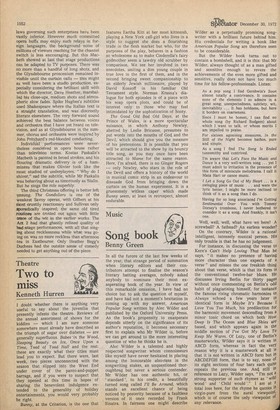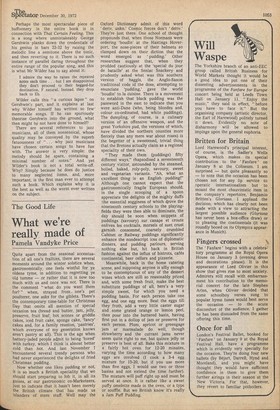Music
Song book
Benny Green
In all the furore of the last few weeks of the year, that strange period of summation when literary editors and their contributors attempt to finalise the season's literary batting averages, nobody asked anybody to nominate their most exasperating book of the year. In view of • this remarkable omission, I have had no choice but to ask the question of myself, and have had not a moment's hesitation in coming up with my answer, American Popular Song written by Alec Wilder and published by the Oxford University Press. As the book's propensity to exasperate depends utterly on the significance of its author's reputation, it becomes necessary first to explain who Mr Wilder is, before we can get around to the more interesting question of who he thinks he is.
Alec Wilder is a talented and highly respected songwriter whom connoisseurs like myself have never hesitated in placing among the honourable also-rans in the songwriting stakes, an unquestioned thoroughbred but never a serious contender. Mr Wilder has one authentic hit, or ' standard ', to his credit, a beautifully turned song called I'll Be Around, which stands an excellent chance of being noticed by posterity because of a faultless version of it once recorded by Frank Sinatra. In fairness one might describe Wilder as a perpetually promising songwriter with a brilliant future behind him. His credentials for writing a book like American Popular Song are therefore seen to be considerable.
But the Wilder book turns out to contain a bombshell, and it is this: that Mr Wilder, always thought of as a man gifted and sensitive enough to revere the achievements of the even more gifted and sensitive, really does not have too much time for his fellow-professionals. Listen:
As a pop song I find Gershwin's Soon almost totally a contrivance. It contains none of the elements I so admire in a great song; unexpectedness, subtlety, wit, inevitability , It has boldness, but here it borders on coarseness.
Since I must be honest, I can find no whole song (by Richard Rodgers) about which I want to talk, or whose merits I am impelled to praise.
For sixteen agonising measures, In the Still of the Night becomes bathos, pure and simple.
As a song I find The Song Is Ended tunesmithy and contrived.
I'm aware that Let's Face the Music and Dance is a very well-written song ... yet must admit to irritation in the presence of this form of miniscule melodrama. I call it Mata Hari or canoe music.
I Let a Song Go Out of My Heart • • is a swinging piece of music . . . and were the lyric better, I might be more inclined to think of it as a song than I do.
Having for so long associated /'m Getting Sentimental Over You with Tommy Dorsey's trombone, I never bothered to consider it as a song. And frankly, it isn't one.
Well, well, well, What have we here? A screwball? A fathead? An earless wonder?
On the contrary, Wilder is a rational intelligent, intensely musical person. His only trouble is that he has no judgement.
For instance, in discussing the verse to Kern's Can't Help Loving That Man he says, "it makes no pretence of having more character than one expects of a verse " and misses the one freakish thing about that verse, which is that its form is the conventional twelve-bar blues. He discusses Irving Berlin for thirty pages without once commenting on Berlin's odd habit of plagiarising himself, for instance the famous rising chromatic harmonies in Always echoed a few years later in identical form in Maybe It's Because I Love You Too Much, his predilection for the harmonic movement descending from a minor tonic chord on which both How Deep Is The Ocean and Blue Shies are based, and which appears again in the middle section of I've Got My Love To Keep Me Warm. Of Lazy, one of Berlin's masterworks, Wilder says it is written in ABCD form, whereas in fact the verY reason why it is a masterwork at all is that it is not written in ABCD form but in ABCDEFGH form, that is to say, none of its eight sections of four bars each quite repeats the previous one. And still la reference to Lazy, Wilder says, "I'm not a strong supporter of such rhymes as 'wild wood' and ' Child would '." I am at .0 total loss here, for the rhyme he quotes is virgin-pure from the aural viewpoint, which is of course the only viewpoint of any relevance. Perhaps the most spectacular piece of buffoonery in the entire book is in connection with That Certain Feeling. This is a song where unmistakeably George Gershwin planks down the credentials of his genius in bars 23-32 by raising the melodic line a semitone above the tonic, and then reverting to it, There is no such instance of parallel daring throughout the entire range of the popular song, and this is what Mr Wilder has to say about it: I admire the way he raises the repeated notes each time . . .but I am disappointed they don't proceed to their begged-for destination, F natural. Instead, they drop back to Eb.
Wilder calls this "a curious lapse " on Gershwin's part, and it explains at last why Wilder himself has written so few ' memorable songs. If he can spuriously theorise Gershwin into the ground, what then might he not have done to himself? There are several references to jazz musicians, all of them nonsensical, whose quality may be conveyed by the superb fatuousness of " ... why jazz musicians have chosen certain songs to have fun with. The answer is very simple: the melody should be spare, containing a minimal number of notes." And yet Wilder's book is not a total write-off. Why? Simply because he does do justice to many neglected items, and, more important, is the first man ever to attempt such a book. Which explains why it is the best as well as the worst ever written on the subject.



































 Previous page
Previous page